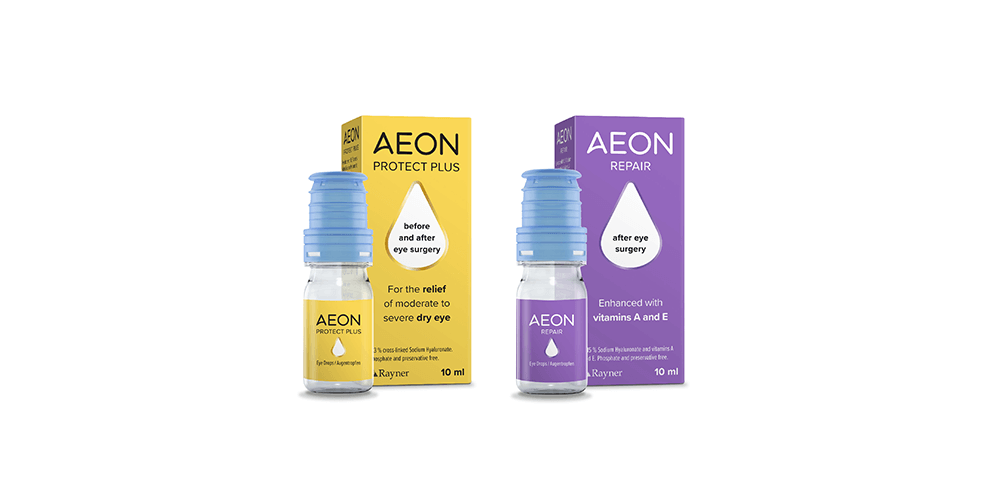
Delivering improved visual outcomes for patients for more than a century, Rayner is well placed to understand the challenges that can be experienced following eye surgery – including dry eye disease (DED). Up to 75 percent of cataract patients suffer from DED (1), a condition that alters the thickness and quality of the tear film, shifting the refractive power of the cornea by up to 2 diopters and seriously affecting visual quality (2, 3). Rayner created the AEON tear film therapy family to help physicians treat ocular surface disease (OSD), both before and after surgery.
Two of the products within the range are: AEON Repair and AEON Protect Plus. These eye drops have been specifically formulated to meet surgeons’ needs and achieve the best visual outcomes; both are preservative and phosphate-free. AEON Protect Plus contains 0.3% cross-linked Sodium Hyaluronate (HA), the eye’s natural lubricant, to provide longer-lasting lubrication than that achieved with traditional linear HA, while AEON Repair is enhanced with antioxidant-rich vitamin E and vitamin A to support healing.
Purvi Thomson, Specialist Optometrist at Ophthalmic Consultants of London, UK, (www.oclvision.com), explains how AEON tear film therapies support accurate pre-surgical measurements and optimised post-surgical outcomes in her patient population.
Dry eye disease is a highly prevalent condition; one that is very common among patients presenting for cataract surgery. It is well known that a poor tear film results in unfavourable surgical outcomes – an even more important factor given patients’ increasing expectation of spectacle independence. A poor tear film can result in incorrect amplitude and axis of astigmatism and an incorrect choice of IOL power, which in turn can result in a “refractive surprise” post-op and, in short, patient dissatisfaction.
At my practice, all surgical patients are subjected to rigorous testing, including additional topography measurements and dry eye evaluation, which ensures we have accurate biometry. If there is any evidence of OSD, the patient is advised on dry eye treatment. We recommend a variety of artificial tears and gels, including AEON Protect Plus, for our patients, but we may also suggest warm compression of the lids, vitamin supplements, and a short course of steroids (if necessary).
The use of artificial tears is highly effective in helping treat DED and providing a healthy tear surface layer for accurate pre-surgical measurements. And that’s especially important when considering the use of premium IOLs, such as multifocals and trifocals, where dry eye can be the limiting factor.
Patients can also suffer with dry eye post-surgery, which can cause uncomfortable eyes, as well as fluctuating vision. By treating the surface pre-surgery, it is possible to reduce post-surgical symptoms and increase patient satisfaction. All post-op patients are sent home with artificial tears – not only to provide comfort and promote wound healing, but also to help provide a stable tear film for optimum clarity of vision. AEON Repair is one of the drops that has been shown to effectively aid healing post-surgery and is also preservative and phosphate-free.
We have found that a thorough pre-surgery evaluation of OSD results in fantastic visual outcomes and very high patient satisfaction. Chair time is also reduced, as patients are happy to be discharged at their follow-up appointment.
I advise all surgery patients with OSD to be given artificial tears both pre- and post-op. Our practice has also found that providing these drops to all patients with toric, multifocal, and trifocal IOLs results in brilliant post-op results.
Note that DED can cause a further reduction in contrast sensitivity, which can be a problem in patients who wish to have trifocals. And so, by treating DED with the additional use of artificial tears, such as AEON Repair and Protect Plus, we could increase the number of patients suitable for these premium lenses and promote more favourable outcomes after surgery.


"A poor tear film can result in incorrect amplitude and axis of astigmatism and an incorrect choice of IOL power, which in turn can result in a “refractive surprise” post-op and, in short, patient dissatisfaction."
We have found that a thorough pre-surgery evaluation of OSD results in fantastic visual outcomes and very high patient satisfaction. Chair time is also reduced, as patients are happy to be discharged at their follow-up appointment.
I advise all surgery patients with OSD to be given artificial tears both pre- and post-op. Our practice has also found that providing these drops to all patients with toric, multifocal, and trifocal IOLs results in brilliant post-op results.
Note that DED can cause a further reduction in contrast sensitivity, which can be a problem in patients who wish to have trifocals. And so, by treating DED with the additional use of artificial tears, such as AEON Repair and Protect Plus, we could increase the number of patients suitable for these premium lenses and promote more favourable outcomes after surgery.


Talk to your Rayner representative for more information on AEON, or visit www.rayner.com/aeon
References
- EuroTimes Supplement February 2019: "Diagnosing and Treating Ocular Surface Disease in Surgical."
- EuroTimes Supplement February 2018: "Ocular Surface Disease."
- E Tu, Cornea Day, ASCRS 2011.
